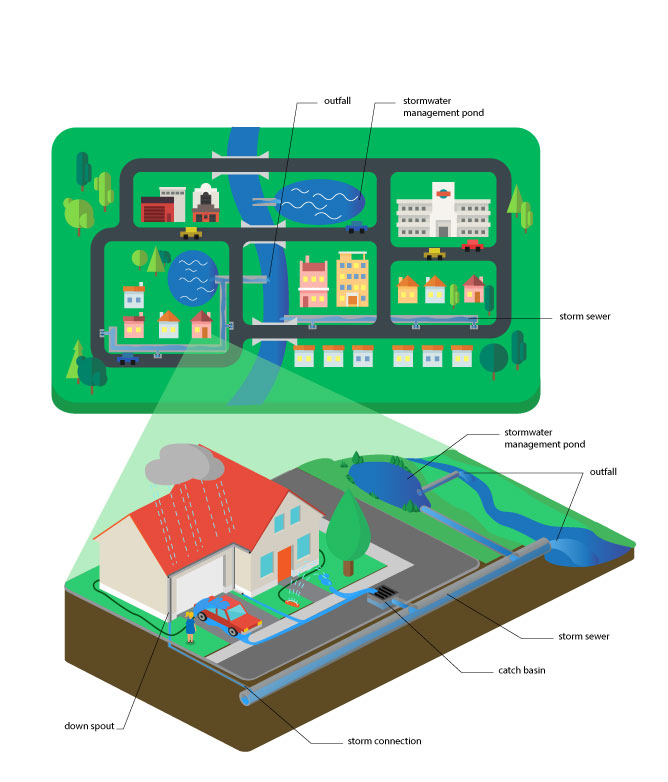On this page
In natural areas, rainfall or melted snow soaks into the soil, is absorbed by trees and plants, evaporates into the air, or flows into streams, lakes, rivers, and wetlands.
In cities, rainfall and melted snow travel much more quickly over roofs, driveways, and roads. Water runs off these surfaces, collects pollutants like dirt, oil, fertilizer, grass clippings, pet waste, litter etc. and carries them to our rivers and waterways.
After storms, heavy rains or snow melts, water levels can rise and cause flooding.
Help keep storm drains clear
Keeping storm drains and catch basins clear of leaves, dirt, litter and ice help reduce the risk of our roads flooding during heavy rain and storms.
Storm drains and catch basins let rain and melted snow flow into our storm sewer system which drains into the nearest stormwater pond, creek, river or lake.
Stormwater runoff is not treated before flowing into local waterways – only rain should go down the storm drain.
Report a spill
Stormwater isn’t processed through Guelph’s Water Resource Recovery Centre. It flows directly into the Speed River. That’s why it’s so important to prevent harmful substances from flowing into the storm drains on your street
If you see a person or organization dumping anything into a storm sewer or catch basin, or spilling chemicals or contaminants on the ground or in a waterway please call:
- Guelph Environmental Protection Officer 519-837-5629 TTY: 519-826-9771
- Ontario Spills Action Centre 1-866-663-8477 (MOETIPS) TTY: 1-855-889-5775
Please provide the time, location, type and volume of the spilled material, and describe any actions being taken to control the spill.
Don’t disrupt stormwater ponds

Stormwater management ponds may look like natural areas, but they’re actually an important part of the City’s infrastructure.
Stormwater management ponds collect melted snow or water runoff from storm sewers and slowly release it into our waterways.
Please don’t add or remove plants near stormwater ponds. Plants and long grass help ponds function properly. We remove debris and invasive plants regularly, without using pesticides. We also maintain gates, locks, valves, etc. and perform repairs and bank stabilization, when necessary.
Stormwater Fish Research
Researchers from the Turko lab at the University of Guelph will be collecting fish from stormwater management facilities around the City of Guelph to support an ongoing research program focussed on understanding how fishes cope with environmental disturbances. A particular focus of the lab is understanding how native fish tolerate environmental factors that affect metabolism and respiration, including high temperatures, low dissolved oxygen, and suspended sediment. This research will advance the science community’s understanding of fundamental questions about biodiversity such as how species have evolved to thrive in their preferred habitats. It will also provide critical information for conservation and management of stormwater management facilities, and in particular, understanding the levels of sediment exposure that negatively impact fish.
Stormwater management ponds maintenance
Why we do this work
Stormwater management ponds help prevent floods and reduce pollution in Guelph’s rivers and waterways. The ponds collect rainwater and melted snow runoff from roofs, roads, driveways and lawns.
The City carries out maintenance of stormwater management ponds to make sure they continue to work properly. Maintenance is completed at all ponds across Guelph on a rotating basis.
What to expect
Vehicles and machinery will be on site at each of the ponds while the work is being completed. Some noise should be expected during working hours.
The maintenance work involves removing sediment and some plants from the pond that may include trees. Native plants play an important role in stormwater management, therefore self-seeded and invasive species that interfere with how the pond works will be removed.
Upcoming maintenance
- Maintenance Notice – Stormwater Management Facility #4 – Located at 299 Cole Road
- Maintenance Notice – Stormwater Management Facility #37 – Located at 44 Buckthorn Crescent
- Maintenance Notice – Stormwater Management Facility #54 – Located at the end of Fletcher Court
To learn more about this upcoming maintenance, read our frequently asked questions.
Stormwater Management Facility Condition Assessments
The City of Guelph is conducting condition assessments at forty (40) stormwater management facilities (SWMF) throughout the city. The purpose of the condition assessments is to determine the extent of sediment that has accumulated in the SWMFs and identify any infrastructure repair requirements. The condition assessment results will inform the City’s SWMF maintenance programming for the next several years.
The City of Guelph has hired Aquafor Beech Limited to carry out the condition assessments. Aquafor Beech will be completing bathymetric surveys and inspections at the 40 SWMF throughout November and December 2025. Sediment sampling will be completed in Spring 2026, as required. All work will be conducted during daytime hours and should not result in any disturbance to nearby residents.
Stormwater Management Master Plan
The master plan is a long-term plan that looks at how the City is currently managing stormwater and guides how we will continue to do so over the next 25 years. It will take into account government legislation, technological advances and infrastructure needs, and address issues we face today like flood control, maintaining the quality of our local waterways (rivers, lakes and streams) and drinking water supply (groundwater), the overall environment and maintaining local water balance.
Annual reports
The City’s stormwater management facilities are operated under a Consolidated Linear Infrastructure Environmental Compliance Approval (CLI ECA) issued by the Ontario Ministry of the Environment, Conservation and Parks (MECP). Under this approval, the City prepares and submits to the MECP a report annually that summarizes the performance of the stormwater infrastructure including inspections, operating issues and corrective actions, maintenance and repairs.
2024 Annual Performance Report for the City of Guelph Stormwater Services
Resources
- More ways to help protect Guelph’s water supply
- Grand River Conservation Authority: Water and Floods
- Insurance Bureau of Canada: Preparing for water-related damage
For more information
City of Guelph Stormwater Services
519-822-1260 extension 3486
[email protected]
